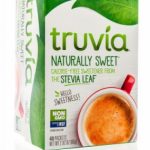The safety of consuming artificial sweeteners has taken a BIG hit this year. I’ve warned you about them in the past.
Despite marketing claims, they contribute to a larger waistline and the development of metabolic disorders like diabetes.
Many artificial sweeteners are neurotoxins. They over stimulate neuron receptors which, over time, destroys brain cells.
They can cause headaches, insomnia, seizures and other neurological side effects. This can also lead to serious health problems such as multiple sclerosis, Alzheimer’s disease and Parkinson’s disease.
Plus, these sweeteners are associated with a decline in kidney function. And sucralose (chlorinated sucrose), in particular, is linked to low thyroid function and reduced production of thyroid hormones – both of which can lead to slower metabolism and weight gain.
You wouldn’t think it could get any worse than that, but it does.
Like ultra-processed foods, artificial sweeteners introduce foreign, unknown and unproven ingredients into the human diet.
From the very beginning, the health consequence of fake sweeteners has never been extensively explored. It is only in recent years that the negative effects they have on the human body has become more conclusive.
And the news is not good.
Heart-Stopping Sweetness
Many studies show that artificial sweeteners have a very negative effect on cardiovascular health, and two recent studies reinforces this message.
A March 2024 study sent a solid warning: Drinking artificially sweetened beverages increases the risk atrial fibrillation (AFib), or irregular heartbeat, by about five times. This, in turn, presents a three- to five-time higher risk of suffering an ischemic stroke – the kind of stroke that occurs due to blood clotting.
The researchers acquired dietary data from 200,000 adults enrolled in the UK Biobank who were free of AFib. Over the next 10 years, 9,362 people developed the condition.
After delving into the participant’s dietary habits, it turned out that adults who drank two or more liters of artificially sweetened beverages each week increased their risk of AFib by 20%. (This is double the risk compared to people who drank similar amounts of regular sugar-sweetened beverages.)
Two liters sounds like a lot of soda, but it’s not! If you break it down, just six 12-ounce cans of diet soda (or four 16-ounce bottles) can quickly take you up that two-liter mark. If you drink one or more every day, you’re already surpassing that mark.
Now, earlier this month, a study released in the European Heart Journal warns that the low-calorie sweetener xylitol is linked to a higher risk of heart attack, stroke and other cardiovascular events. This sugar alcohol causes blood platelets to clot – which can lead to thrombosis and result in a stroke or a heart attack.
One of the most important pieces of news in this study is that after ingesting a typical drink containing xylitol, blood levels went up 1,000-fold. (When you eat or drink sugar, glucose levels may go up 10% or 20%; but not even close to 1,000 times.) And every measure of clotting increased immediately following ingestion!
In March of 2023 similar results were seen for erythritol, a sugar alcohol found in Truvia and Splenda Naturals Stevia Sweeteners.
Too bad we have only learned about these dangers in recent years. Otherwise, I’m sure a lot of people would have made healthier choices in the past, and a lot of cardiovascular issues may have been avoided.
Say Goodbye to Artificial Sugar Sweeteners!
If you want to sweeten your foods and beverages without the dangers associated with artificial sweeteners, sugar or high fructose corn syrup, I recommend using all-natural stevia – without any artificial additions. It’s a safe, calorie-free sweetener that doesn’t carry any of the risks you find with refined sugar or artificial sweeteners.
In fact, it has some decidedly beneficial health effects.
First and foremost, compared to sugar and no-calorie sweeteners, stevia reduces after-meal glucose and insulin response – meaning it has a positive effect on your metabolism.
Secondly, regular use of stevia can help lower blood pressure by up to 12 points on the top number (systolic) and 8 points on the bottom (diastolic) in people with hypertension. And the results start showing up after just two weeks of use.
But here is a word of warning. If you choose to try stevia, don’t go out and buy Truvia. It’s not the same thing.
This product is advertised as a “stevia-based” sweetener. But it doesn’t contain an ounce of steviosides. Instead, it has a tiny, insignificant amount of rebaudioside in it. While this compound comes from the stevia plant, it doesn’t have the same health benefits.
In truth, the main ingredient in Truvia is erythritol, a sugar alcohol that’s made from genetically altered corn. So make sure to buy a natural stevia sweetener – not one that’s just using the word “stevia” to make it sound healthy.
In the meantime, if most of your sugar-substitute comes from soft drinks, try weaning yourself off of them. Sparkling water is a great start. It is fizzy like a soda and comes in many unsweetened flavors such as lemon, lime, tangerine, berry and more.
Tea is also a great choice over sodas; and water is always my top recommendation to quench your thirst.
SOURCES:
Fagherazzi G, Gusto G, Affret A, Mancini FR, Dow C, Balkau B, Clavel-Chapelon F, Bonnet F, Boutron-Ruault MC. Chronic Consumption of Artificial Sweetener in Packets or Tablets and Type 2 Diabetes Risk: Evidence from the E3N-European Prospective Investigation into Cancer and Nutrition Study. Ann Nutr Metab. 2017;70(1):51-58.
Pase MP, Himali JJ, Beiser AS, Aparicio HJ, Satizabal CL, Vasan RS, Seshadri S, Jacques PF. Sugar- and Artificially Sweetened Beverages and the Risks of Incident Stroke and Dementia: A Prospective Cohort Study. Stroke. 2017 May;48(5):1139-1146.
Ardalan MR, Tabibi H, Ebrahimzadeh Attari V, Malek Mahdavi A. Nephrotoxic Effect of Aspartame as an Artificial Sweetener: A Brief Review. Iran J Kidney Dis. 2017 Oct;11(5):339-343.
Oliynyk O. The influence of sucralose on thyroid gland function. Health Problems of Civilization. 2021;15(1):12-16.
Debras C, Chazelas E, Sellem L, Porcher R, Druesne-Pecollo N, Esseddik Y, de Edelenyi FS, Agaësse C, De Sa A, Lutchia R, Fezeu LK, Julia C, Kesse-Guyot E, Allès B, Galan P, Hercberg S, Deschasaux-Tanguy M, Huybrechts I, Srour B, Touvier M. Artificial sweeteners and risk of cardiovascular diseases: results from the prospective NutriNet-Santé cohort. BMJ. 2022 Sep 7;378:e071204.
Sun Y, Yu B, Yu Y, Wang B, Tan X, Lu Y, Wang Y, Zhang K, Wang N. Sweetened Beverages, Genetic Susceptibility, and Incident Atrial Fibrillation: A Prospective Cohort Study. Circ Arrhythm Electrophysiol. 2024 Mar;17(3):e012145.
Heart and Stroke Foundation of Canada. News Article. ©2024.
Sweetened drinks linked to atrial fibrillation risk. American Heart Association. Press Release. Mar 2024.
Witkowski M, Nemet I, Li XS, Wilcox J, Ferrell M, et al. Xylitol is prothrombotic and associated with cardiovascular risk. European Heart Journal. 2024; ehae244.
Witkowski M, Nemet I, Alamri H, Wilcox J, Gupta N, Nimer N, Haghikia A, Li XS, Wu Y, Saha PP, Demuth I, König M, Steinhagen-Thiessen E, Cajka T, Fiehn O, Landmesser U, Tang WHW, Hazen SL. The artificial sweetener erythritol and cardiovascular event risk. Nat Med. 2023 Mar;29(3):710-718.
Anton SD, Martin CK, Han H, Coulon S, Cefalu WT, Geiselman P, Williamson DA. Effects of stevia, aspartame, and sucrose on food intake, satiety, and postprandial glucose and insulin levels. Appetite. 2010 Aug;55(1):37-43.
Chan P, Tomlinson B, Chen YJ, Liu JC, Hsieh MH, Cheng JT. A double-blind placebo-controlled study of the effectiveness and tolerability of oral stevioside in human hypertension. Br J Clin Pharmacol. 2000 Sep;50(3):215-20.






